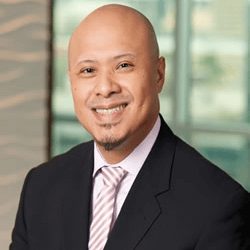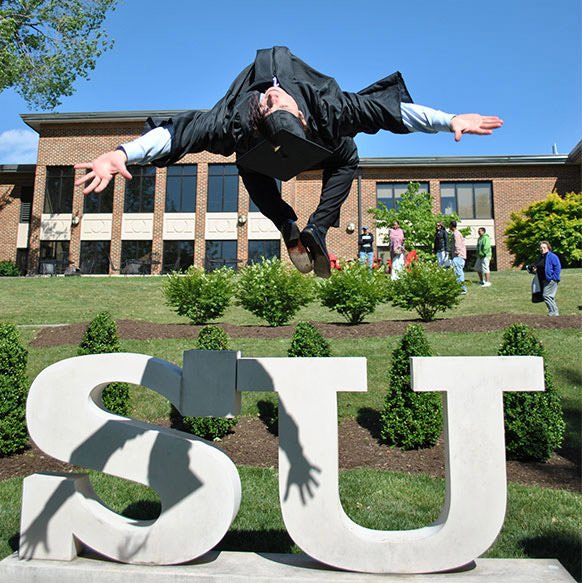Dr. Miles K. Davis is the George Edward Durell Chair of Management and Dean of the Harry F. Byrd, Jr. School of Business at Shenandoah University in Winchester, Virginia.
Prior to becoming the dean of the Business School in July 2012, Dr. Davis served as the founding director of the Institute for Entrepreneurship at the Harry F. Byrd, Jr. School of Business. He continues to teach courses on entrepreneurship, as well as conduct research and publish on the intersection of religion and entrepreneurship. Additionally, Dr. Davis is the host of an award winning radio show on small business and he has numerous media citations.
His engagement in the business community is wide ranging, as he sits on the board of INOVA, Loudoun, the Small Business Development Center, Chamber of Commerce, First Bank and the Amana Mutual Fund.
1. How did you get started in your career as a Business Dean?
I came out of industry in 2001, where in my last position I launched the Change Management Practice for EDS. I launched the Institute for Entrepreneurship at the Business School at Shenandoah University and the dean at the time recognized that I was doing a number of things deans do; raising money, cross campus collaborations, spokesperson for the school, thinking programmatically, etc. As he got closer to retirement I found myself handling a number of his duties. I also developed an understanding of the challenges the business school faced and the opportunities that it could take advantage of. This led to me being selected by the search committee, senior vice president of academic affairs, president and board of trustees to become the dean of the Harry F. Byrd, Jr. School of Business.
2. What do you think are some of the leadership qualities an effective Business Dean should have?
He or she must be able to articulate a vision for the school, even if it is to stay the course, and enlist faculty and staff in implementing that vision. Also, a dean must learn to get to “yes” with various constituencies while at the same time recognizing the power of “no”. The final thing I will mention here is that collaboration is important. However, there are some decisions which have to be taken that are the responsibility of the dean. You cannot be afraid to take a decision and stand by it.
3. Business is constantly changing, what types of things is your school doing to make sure students are learning the most updated business information?
We not only review and update our strategic plan every five (5) years, we review our undergraduate and graduate programs for relevancy. We work closely with our advisory board to identify the skills industry are seeking and we have no sacred cows. Students learning and preparation are at the heart of our decision making and we respond to changes in their needs and environment accordingly.
4. Faculty play a critical role in the development of your student’s learning and in helping build their business competencies. What type of things are your faculty involved in and doing that makes their classroom unique to the student’s learning experience?
At the Byrd School of Business we do not hire faculty who do not have industry experience. We are a balanced school and you must produce quality scholarship and be an effective teacher. These three things in themselves allows students to have a unique learning experience. In addition we offer opportunities for experiential learning and engagement with the global business community through our Global Experencial Learning program.
5. What type of qualifications and experiences do your faculty bring to the class? How do you make sure they stay updated in their area of expertise and field of study?
As I said before they must have experience in industry. All of our professors have Ph.D.s from AACSB accredited institutions. They are required to produce peer reviewed journal articles, as well as engage in other forms of scholarly contributions (e.g. Trade journal articles, book chapters, etc.)
6. Do your students have input on faculty promotion, award and recognition program? If so, can you expand on this and provide examples.
Students can, and do, nominate faculty members for teaching awards. Also, student s hold an award dinner to recognize the various contributions of faculty members.
7. MBA degrees are still in high demand, but the competition is larger than ever. How does your MBA program differ from other schools?
We offer a generalist MBA that prepares one to operate at the mid-level manager or above. We have them do projects from the real world and classroom activities allows them to leverage their work experience. We bridge theory and practice to prepare our students for promotion within their existing organization or a new career path.
8. Almost every university is going online or trying to offer online degree programs. What is your business school doing in the online space and how do you set yourself apart?
We are not following the herd online. We are a traditional campus and serve that population very well. Our residential programs continue to see double digit increases because we do offer them more then content. We seek to educate and develop the whole person and offer them the experience that only comes from being in a college campus.
9. What do you think are some of the biggest challenges that business schools are facing now and what his your school doing to confront them?
The biggest challenge business schools face, is the same challenge higher education faces, visionary leadership. We need deans, faculty, staff and administrators who are willing to rethink what we do and how we do it. We need to use the tools we teach students about and make our educational offerings and experiences relevant.
10. We learned a great deal about you and your school. If I was a potential student or employer that was stuck between choosing two different MBA programs, what other things would you want me to know about your degree and school to help with my selection?
Fit is the most important thing. We are not for everybody. We offer personalized, intensive education. The professors know your name and they get to know you. We believe and applied knowledge that extend beyond theoretical constructs. If that is something you are looking for than you must consider the Harry F. Byrd, Jr. School of Business at Shenandoah University.

Dr. Emad Rahim is an award-winning entrepreneur, educator, author, community leader and TEDx Speaker. He currently serve as the Endowed Entrepreneur-in-Residence at Oklahoma State University and teaches at the Jack Welch Management Institute in the Executive MBA program. He was recognized by the United Nations Foundation as a 2013 Empact100 Honoree for his social entrepreneurship work, received a Congressional Award for his community service and was the recipient of the Forty Under 40 Business Leadership Award sponsored by Syracuse University. His personal story was turned into a short documentary, “Against the Odds,” and featured in the Huffington Post and Forbes. He co-authored “Leading Through Diversity: Transforming Managers Into Effective Leaders” and “The 4-Tions: Your Guide to Developing Successful Job Search Strategies” and is a frequent contributor to the Refractive Thinker book series, CEO Magazine, TweakYourBiz and YFS Entrepreneurship Magazine. Fellow him on Twitter @DrEmadRahim












